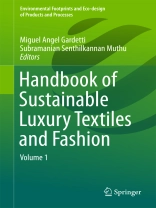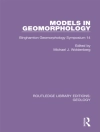The first volume of this handbook explores different aspects of sustainable luxury textiles and fashion, broadly based on the following topics: Sustainability and business management, Value chain management, Use of materials and Sustainable production processes.
Tabella dei contenuti
The Lotus Flower fiber and sustainable luxury.- Flax: Sustainability is the New Luxury.- Great potential of stinging Nettle for sustainable textile and fashion.- Sustainable Luxury Natural Fibers –Production, Properties and Prospects.- Sustainable processing of luxury textiles.- Sustainability in luxury textile applications: a contradiction or a new business opportunity?.- Specialty Chemical Finishes for Sustainable Luxurious Textiles.- Book Chapter for Handbook of Sustainable luxury textiles and Fashion- Vol 1.
Circa l’autore
Miguel Angel Gardetti Ph.D. He has been the head of the Center for Study of Corporate Sustainability (IESC) since its foundation in 2002, and he also holds the same position at the Center for Study of Sustainable Luxury. He is head professor in MBA and master’s programs both in Argentina and abroad. He has provided training within frameworks of executive education and in house programmes to CEOs and Corporate Managers both from domestic and multinational companies in Argentina and Latin America.
As to Luxury and Sustainability topics, he lectured at the IE Business School (Madrid, Spain), one of the top Business Schools in Europe. Moreover, he was a speaker in Identidad Uruguay, an event organised by the Universidad de Empresa (Montevideo), with a lecture on Fashion, Luxury, and Sustainability. He was the creator of the Best Performance in Sustainable Luxury in Latin America Award (at present evolving towards the IE Award for Sustainability in The Premium and Luxury Sectors at a global level). He developed also several publications in the area of sustainable luxury: the Journal of Corporate Citizenship special issue on “sustainable luxury” and the books titled “Sustainable Luxury – Managing Social and Environmental Performance in Iconic Brands” and “Sustainable Luxury and Social Entrepreneurship – Stories from the Pioneers”.
He was a member of the United Nations Global Compact Promoting Group in Argentina and a member of its governance body –the Board of the Argentine Chapter of The Global Compact- for two consecutive terms. He was co-founder of the Global Compact Chair in Argentina, and he was also part of the task force that developed the “Management Responsible Education Principles” of the United Nations Global Compact. He has also coordinated tasks for the Inter-American Development Bank, the International Finance Corporation (private sector arm of the World Bank), the Netherlands Development Organisation, the United Nations (New York), and the World Resources Institute (USA.)












